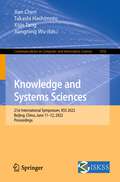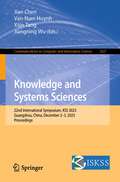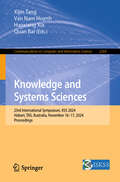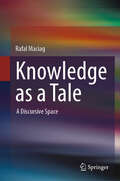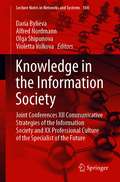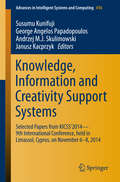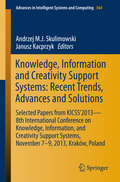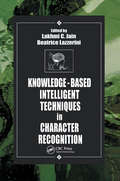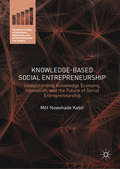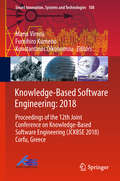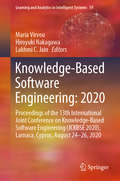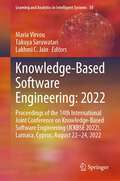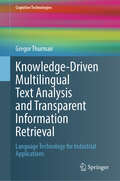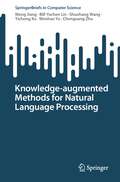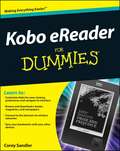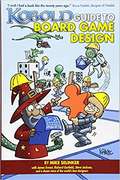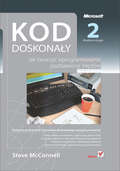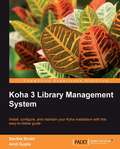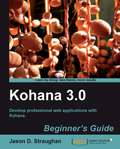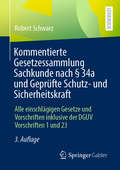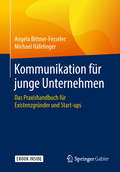- Table View
- List View
Knowledge and Systems Sciences: 21st International Symposium, KSS 2022, Beijing, China, June 11–12, 2022, Proceedings (Communications in Computer and Information Science #1592)
by Jian Chen Xijin Tang Takashi Hashimoto Jiangning WuThis book constitutes the refereed proceedings of the 21st International Symposium on Knowledge and Systems Sciences, KSS 2022, held in Beijing, China, in June 2022.The 14 revised full papers and 3 short paper presented were carefully reviewed and selected from 51 submissions. The papers are organized in topical secions on data mining and machine learning; model-based systems engineering; complex systems modeling and knowledge technologies.
Knowledge and Systems Sciences: 22nd International Symposium, KSS 2023, Guangzhou, China, December 2–3, 2023, Proceedings (Communications in Computer and Information Science #1927)
by Jian Chen Xijin Tang Van-Nam Huynh Jiangning WuThis book constitutes the proceedings of the 22nd International Symposium, KSS 2023, held in Guangzhou, China, during December 2–3, 2023. The 20 full papers included in this volume were carefully reviewed and selected from 56 submissions. The volume is divided in topical sections that cover the following topics: data mining and machine learning, complex systems modeling, decision analysis and knowledge management, opinion mining and knowledge technologies.
Knowledge and Systems Sciences: 23rd International Symposium, KSS 2024, Hobart, TAS, Australia, November 16–17, 2024, Proceedings (Communications in Computer and Information Science #2269)
by Quan Bai Xijin Tang Van Nam Huynh Haoxiang XiaThis book constitutes the refereed proceedings of the 23rd International Symposium on Knowledge and Systems Sciences, KSS 2024, held in Hobart, Tasmania, Australia, during November 16–17, 2024. The 23 full papers presented in this book were carefully reviewed and selected from 50 submissions. They are organized in the following topical sections: Complex networks and modeling; Opinion dynamics; Knowledge technologies and systems engineering; Knowledge management.
Knowledge as a Tale: A Discursive Space
by Rafal MaciagThis text describes the process that led to knowledge becoming the most important modern good and a complex phenomenon beginning at the end of the 19th century. It was a change in the way of understanding the world proposed by mathematics and geometry. This volume reveals how the paradigm shift, still in progress, is gradually transforming less obvious fields of science, such as the humanities and social sciences while affecting the phenomenon of knowledge. Firstly, meta-analysis gained importance, and secondly, it became natural to perceive knowledge in a social context, showing its diverse and multi-cause dispersion, leading to the phenomenon of knowledge. Due to the interpretation of knowledge as a complex social phenomenon, the author proposes a new model of knowledge description, called the theory of discursive space, making it possible to describe the role and meaning of knowledge as a component of modern civilization that is all-encompassing. This text appeals to students and researchers working in the philosophy of technology.
Knowledge in the Information Society: Joint Conferences XII Communicative Strategies of the Information Society and XX Professional Culture of the Specialist of the Future (Lecture Notes in Networks and Systems #184)
by Alfred Nordmann Daria Bylieva Olga Shipunova Violetta VolkovaThis book provides a snapshot of state-of-the-art interdisciplinary discussions in Russia about technology in the information society. New technologies are subject to original theoretical analysis, but there are also reflections on the practical experience of their application. The book covers a range of topics which includes human–technology interaction, education in digital reality, distance education due to COVID-19 quarantine measures, cognitive technologies, system analytics of information and communication technologies. The book collects contributions from philosophy, didactics, computer sciences, sociology, psychology, media studies, and law. It contains a selection of papers accepted for presentation at the XX International Conference «Professional Culture of the Specialist of the Future» (26–27 November 2020, St. Petersburg) and the XII International Conference «CommunicativeStrategies of the Information Society» (23–24 October 2020, St. Petersburg).
Knowledge, Information and Creativity Support Systems
by George Angelos Papadopoulos Janusz Kacprzyk Susumu Kunifuji Andrzej M. J. SkulimowskiThisvolume consists of a number of selected papers thatwere presented at the 9th International Conference on Knowledge, Informationand Creativity Support Systems (KICSS 2014) in Limassol, Cyprus, after theywere substantially revised and extended. The 26 regularpapers and 19 short papers included in this proceedings cover all aspects ofknowledge management, knowledge engineering, intelligent information systems,and creativity in an information technology context, including computationalcreativity and its cognitive and collaborative aspects.
Knowledge, Information and Creativity Support Systems: Recent Trends, Advances and Solutions
by Janusz Kacprzyk Andrzej M.J. SkulimowskiThis volume contains some carefully selected papers presented at the 8th International Conference on Knowledge, Information and Creativity Support Systems KICCS'2013, which was held in Kraków and Wieliczka, Poland in November 2013. In most cases the papers are extended versions with newer results added, representing virtually all topics covered by the conference. The KICCS'2013 focus theme, "Looking into the Future of Creativity and Decision Support Systems", clearly indicates that the growing complexity calls for some deeper and insightful discussions about the future but, obviously, complemented with an exposition of modern present developments that have proven their power and usefulness. Following this theme, the list of topics presented in this volume include some future-oriented fields of research, such as anticipatory networks and systems, foresight support systems, relevant newly-emerging applications, exemplified by autonomous creative systems. Special attention was also given to cognitive and collaborative aspects of creativity.
Knowledge-Based Intelligent Techniques in Character Recognition (International Series On Computational Intelligence Ser. #9)
by Lakhmi C. Jain; Beatrice LazzeriniKnowledge-Based Intelligent Techniques in Character Recognition presents research results on intelligent character recognition techniques, reflecting the tremendous worldwide interest in the applications of knowledge-based techniques in this challenging field.This resource will interest anyone involved in computer science, computer engineering, applied mathematics, or related fields. It will also be of use to researchers, application engineers and students who wish to develop successful character recognition systems such as those used in reading addresses in a postal routing system or processing bank checks.Features
Knowledge-Based Social Entrepreneurship: Understanding Knowledge Economy, Innovation, and the Future of Social Entrepreneurship (Palgrave Studies in Democracy, Innovation, and Entrepreneurship for Growth)
by Mitt Nowshade KabirSocial entrepreneurship is on the rise and social enterprises are solving some of the most critical and enduring social problems by using innovative, pragmatic and sustainable business models. Access to knowledge thanks to the Internet and rapid expansion of the knowledge economy are opening new opportunities for social ventures. With knowledge-based social entrepreneurship where knowledge is the primary resource, more pressing social problems can be addressed by using advanced technologies. This book investigates this emerging concept, possibilities that it holds, its place in today’s economy, and links bridges between knowledge, innovation, and social entrepreneurship. Academics, entrepreneurs, students, and NGOs will find the theoretical and practical information presented in this book extremely valuable.
Knowledge-Based Software Engineering: Proceedings of the 12th Joint Conference on Knowledge-Based Software Engineering (JCKBSE 2018) Corfu, Greece (Smart Innovation, Systems and Technologies #108)
by Maria Virvou Konstantinos Oikonomou Fumihiro KumenoThis book summarizes the new research results presented at the 12th Joint Conference on Knowledge-Based Software Engineering (JCKBSE 2018), which took place on August 27–30, 2018 on the island of Corfu, Greece. The JCKBSE is a well-established international biennial conference that focuses on the applications of Artificial Intelligence in Software Engineering. The JCKBSE 2018 was organized by the Department of Informatics of the University of Piraeus, the Department of Computer and Information Engineering of Nippon Institute of Technology, and the Department of Informatics of Ionian University. The book will benefit not only experts and researchers in the field of (Knowledge-Based) Software Engineering, but also general readers in the fields of Artificial Intelligence, Computational Intelligence and Computer Science who wish to learn more about the field of (Knowledge-Based) Software Engineering and its applications. An extensive list of bibliographic references at the end of each paper encourages readers to probe further into the application areas that interest them most.
Knowledge-Based Software Engineering: Proceedings of the 13th International Joint Conference on Knowledge-Based Software Engineering (JCKBSE 2020), Larnaca, Cyprus, August 24-26, 2020 (Learning and Analytics in Intelligent Systems #19)
by Lakhmi C. Jain Maria Virvou Hiroyuki NakagawaThis book summarizes the research findings presented at the 13th International Joint Conference on Knowledge-Based Software Engineering (JCKBSE 2020), which took place on August 24–26, 2020. JCKBSE 2020 was originally planned to take place in Larnaca, Cyprus. Unfortunately, the COVID-19 pandemic forced it be rescheduled as an online conference. JCKBSE is a well-established, international, biennial conference that focuses on the applications of artificial intelligence in software engineering. The 2020 edition of the conference was organized by Hiroyuki Nakagawa, Graduate School of Information Science and Technology, Osaka University, Japan, and George A. Tsihrintzis and Maria Virvou, Department of Informatics, University of Piraeus, Greece. This research book is a valuable resource for experts and researchers in the field of (knowledge-based) software engineering, as well as general readers in the fields of artificial and computational Intelligence and, more generally, computer science wanting to learn more about the field of (knowledge-based) software engineering and its applications. An extensive list of bibliographic references at the end of each paper helps readers to probe further into the application areas of interest to them.
Knowledge-Based Software Engineering: Proceedings of the 14th International Joint Conference on Knowledge-Based Software Engineering (JCKBSE 2022), Larnaca, Cyprus, August 22-24, 2022 (Learning and Analytics in Intelligent Systems #30)
by Lakhmi C. Jain Maria Virvou Takuya SaruwatariThis book contains extended versions of the works and new research results presented at the 14th International Joint Conference on Knowledge-based Software Engineering (JCKBSE2022). JCKBSE2022 was originally planned to take place in Larnaca, Cyprus. Unfortunately, the COVID-19 pandemic forced it to be rescheduled as an online conference. JCKBSE is a well-established international biennial conference that focuses on the applications of Artificial Intelligence on Software Engineering. The 14th International Joint Conference on Knowledge-based Software Engineering (JCKBSE2022) was organized by the Department of Informatics of the University of Piraeus, Greece. This book is a valuable resource for experts and researchers in the field of (knowledge-based) software engineering. It is also valuable to general readers in the fields of artificial and computational intelligence and, more generally, computer science, wishing to learn more about the exciting field of (knowledge-based) software engineering and its applications. An extensive list of bibliographic references at the end of each chapter helps readers to probe deeper into the application areas of interest to them.
Knowledge-Driven Multilingual Text Analysis and Transparent Information Retrieval: Language Technology for Industrial Applications (Cognitive Technologies)
by Gregor ThurmairThis book presents all components and knowledge sources required for Transparent Information Retrieval. Depending on the respective topic and taking care of their interoperability, both deep and shallow technology is used. The processing starts from the analysis of the text data and collects its results in a multilingual conceptual network, this way enabling Transparent Information Retrieval where users communicate with the system in their native language while the documents could be in a different language, transparent to the users. To do so, the author investigates all text analysis components required for multilingual indexing, starting from preparatory work like language and topic identification, continuing with sentence splitting and tokenization (including Chinese), and describing lexical analysis, also for multiword entries and Named Entities. Entries are then disambiguated both on syntactic (by a tagger) and semantic level (by multilingual word sense disambiguation). The analysis results are collected in a dynamic multilingual ConceptNet, which is an index structure extended by monolingual relations (like synonyms, or head-modifier links) as well as multilingual ones (translations). In addition to many European languages also Turkish, Arabic, Persian, and Chinese are treated. The book concludes with a description of components needed to build the required resources, like crawlers, bilingual term extraction, and tools for defaulting linguistic annotations. For each component, readers will find a technology overview, a discussion of its main challenges in computational treatment, a description of the technical solution selected, and evaluation information.
Knowledge-augmented Methods for Natural Language Processing (SpringerBriefs in Computer Science)
by Meng Jiang Bill Yuchen Lin Shuohang Wang Yichong Xu Wenhao Yu Chenguang ZhuOver the last few years, natural language processing has seen remarkable progress due to the emergence of larger-scale models, better training techniques, and greater availability of data. Examples of these advancements include GPT-4, ChatGPT, and other pre-trained language models. These models are capable of characterizing linguistic patterns and generating context-aware representations, resulting in high-quality output. However, these models rely solely on input-output pairs during training and, therefore, struggle to incorporate external world knowledge, such as named entities, their relations, common sense, and domain-specific content. Incorporating knowledge into the training and inference of language models is critical to their ability to represent language accurately. Additionally, knowledge is essential in achieving higher levels of intelligence that cannot be attained through statistical learning of input text patterns alone. In this book, we will review recent developmentsin the field of natural language processing, specifically focusing on the role of knowledge in language representation. We will examine how pre-trained language models like GPT-4 and ChatGPT are limited in their ability to capture external world knowledge and explore various approaches to incorporate knowledge into language models. Additionally, we will discuss the significance of knowledge in enabling higher levels of intelligence that go beyond statistical learning on input text patterns. Overall, this survey aims to provide insights into the importance of knowledge in natural language processing and highlight recent advances in this field.
Kobo eReader For Dummies
by Corey SandlerHere's how to use and love your Kobo Wi Fi eReader, the gadget dedicated to reading! Want to carry hundreds of books, magazines, and newspapers everywhere and not hurt your back? Load this e-book onto your Kobo Wi Fi eReader and we'll show you how! It's a quick-and-easy course in reading electronically, shopping for e-books, converting your own files for the eReader, getting the most from the device, and keeping your Kobo Wi Fi happy. Hello, Kobo -- get acquainted with all the features and controls and learn how to charge the battery Go shopping -- download e-books, find free books, and subscribe to newspapers or magazines Carry more than books -- load PDFs of your travel itinerary, phone numbers, or presentation notes onto your eReader Get connected -- set up and configure your Kobo Wi Fi eReader to access online bookstores Find free stuff -- explore Project Gutenberg, Manybooks.net, Feedbooks, and Google Books for books in the public domain Fix annoying glitches -- find misplaced e-books, resize PDFs, solve wireless connection problems, and reset a stalled eReader Open the book and find: Why E Ink can be better than an LCD screen How to adjust the type size for your comfort Files your eReader can't take Tips for managing and organizing your reading list The difference between EPUBs and PDFs How to reset your Kobo Wi Fi eReader if all else fails Ten must-have accessories for your Kobo Wi Fi Information about valuable software utilities like calibre and Adobe Digital Editions
Kobold Guide To Board Game Design
by David Howell Mike Selinker Jeff TidballPull up a chair and see how the world's top game designers roll. You want your games to be many things: Creative. Innovative. Playable. Fun. If you're a designer, add "published" to that list. The Kobold Guide to Board Game Design gives you an insider's view on how to make a game that people will want to play again and again. Author Mike Selinker (Betrayal at House on the Hill) has invited some of the world's most talented and experienced game designers to share their secrets on game conception, design, development, and presentation. In these pages, you'll learn about storyboarding, balancing, prototyping, and playtesting from the best in the business.
Kod Doskonały: Jak tworzyć oprogramowanie pozbawione błędów (in Polish)
by Steve McconnellKsika jest przejrzyst kompilacj najlepszych technik programowania, zdobya wielkie uznanie w rodowisku.
Kodeen liburua
by Simon SinghMilaka urtez, komunikazioaren eraginkortasuna izan dute ardatz errege-erreginek eta jeneralek beren herrialdeak gobernatzeko eta armadak zuzentzeko. Aldi berean, ondotxo zekiten zer ondorio zituzten beren mezuak esku okerretara iristeak, herrialde lehiakideei sekretu baliotsuak ezagutarazteak eta funtsezko informazioa etsaien esku uzteak. Mezuak etsaien eskuetara heltzeko arrisku eta mehatxuak bultzatu zuen garatzea kodeak eta zifrak: mezuak mozorrotzeko teknikak, dagokion hartzailea bakarrik izan dadin mezua irakurtzeko gai.<P><P> Sekretu-premiaren ondorioz, kodeak egiteaz arduratzen diren sailak sortu dituzte herrialdeek, eta sail horien ardura da ahalik eta koderik egokienak sortzea komunikazioen segurtasuna bermatzeko. Aldi berean, etsaien kode-hausleak kode horiek hausten eta, hala, sekretuak lapurtzen saiatu dira beti. Kode-hausleak hizkuntzaren alkimistak dira, esanahirik gabeko ikurretatik abiaturik esanahidun hitzak biltzeko gai den tribu mistikoa. Kode eta zifren historia kodegileen eta kode-hausleen arteko borroka zaharraren istorioa da, historiaren bilakaeran eragin berebizikoa izan duen arma intelektualen lehia.<P> Kodeen liburua idaztean, bi helburu nagusi izan ditut. Lehenengoa, kodeen eboluzioa deskribatzea. Eboluzioa termino egokia da, bai, kodeen garapena borroka ebolutibo gisa ikus baitaiteke. Kode batek kode-hausleen erasoak jasaten ditu beti. Kode-hausleek kode baten ahultasuna agerian uzten duen arma berriren bat garatzen dutenean, balioa galtzen du kode horrek. Desagertu egiten da, edo kode berri indartsuago bihurtzen. Era berean, kode berri horrek kode-hausleek haren ahulezia aurkitu arte bakarrik balioko du; eta horrela behin eta berriz. Bakterio baten andui infekzioso batekin gertatzen denaren antzekoa da. Bakterioak bizi eta hazi egiten dira, harik eta medikuek bakterioaren ahulezia agerian utzi eta hiltzen dituen antibiotiko bat aurkitzen duten arte. Bakterioek, orduan, eboluzionatu egin behar izaten dute, eta antibiotikoa engainatzen saiatu; eta, hori lortzen badute, aurrera egiten dute, eta berriz zabaltzen dira. Bakterioek eboluzionatu egin behar dute etengabe, antibiotiko berrien sarraskiari ihes egingo badiote.
Kodi em Fire TV & TV Stick: Guia Passo a Passo para Rooting & Jailbreaking com Kodi
by Rob StiegelmanComo instalar o Kodi em Dispositivos Amazon Fire TV & Fire Stick Quando se faz o jailbreaking e instalação do Kodi nos dispositivos Fire TV, ganha acesso a qualquer conteúdo que queira, seja programas de TV e Filmes.. Aqui está o que terá acesso: Tudo sobre o Kodi no Firestsick Instalação do Kodi & Jailbreaking dispositivos Firestick TV - Funciona em todos os dispositivos Solução para problemas que encontre Disfrute o acesso a Filmes, Música, Programas de TV, Apps, & Mais! --> vá para o inicio da página e clique em adicionar a carrinho para compra instantanea Aviso Legal: Este autor e os seus direitos de autor, não faz promessas ou garantias sobre a eficácia completa ou adequada do conteúdos deste livro, e descarta a responsabilidade de erros e omissões nos conteúdos do livro. Este produto é para ser usado apenas como referência.
Koha 3 Library Management System
by Amit Gupta Savitra SirohiWritten in a practical style, this book uses the Linux shell in many chapters, demonstrating the execution of commands and their output. With liberal use of screenshots and plenty of code samples accompanied by careful explanation, it will make the task of installing and configuring Koha easy and straightforward. All chapters are written in a way that makes them applicable to various Linux distributions.This book is aimed at Linux system administrators who need to install and maintain Koha. If you are a system administrator who wants to set up an open source integrated library system, then this book is for you. It will also be useful for system administrators who require help with specific aspects of implementing Koha.
Kohana 3.0 Beginner’s Guide
by Jason D. StraughanThis book follows the Beginner's Guide approach, taking the reader from introduction to the framework through a working case study site. The text offers many examples of working code, and builds an entire test project during the course of the book. Although the chapters lend themselves to consecutive reading, you can pick up the book at any chapter without missing a beat. If you are a web developer who wants to create web applications using the Kohana 3 framework, then this book is for you. The book assumes that you have some experience with PHP and Object- Oriented Programming (OOP).
Kombinatorische Optimierung
by Jens Vygen Bernhard Korte Rabe Von RandowDas umfassende Lehrbuch zur Kombinatorischen Optimierung beruht auf Vorlesungen, die die Autoren an der Universität Bonn gehalten haben. Sie geben den neuesten Stand des Fachgebiets wieder - mit Schwerpunkt auf theoretischen Resultaten und Algorithmen mit guten Laufzeiten und Ergebnissen. Der Band enthält vollständige Beweise, einige davon wurden bisher nicht in der Lehrbuchliteratur publiziert. Die deutschsprachige Neuauflage enthält alle Ergänzungen und Aktualisierungen der 5. englischsprachigen Auflage, darunter mehr als 60 neue Übungsaufgaben.
Kommentierte Gesetzessammlung Sachkunde nach § 34a und Geprüfte Schutz- und Sicherheitskraft: Alle einschlägigen Gesetze und Vorschriften inklusive der DGUV Vorschriften 1 und 23
by Robert SchwarzAlle relevanten Gesetze und Vorschriften der Sicherheitswirtschaft auf einen Blick - die ideale Hilfe bei der Prüfungsvorbereitung und ein schnelles Nachschlagewerk für die Praxis. Der Umgang mit den Gesetzestexten wird durch Kommentare und Hinweise zu den wichtigsten Paragrafen erleichtert, Lernende gewinnen ein besseres Verständnis für die Anwendung der Normen. Die Zusammenstellung ergänzt die beiden Lehrbücher "Sachkundeprüfung im Bewachungsgewerbe IHK" und "Geprüfte Schutz- und Sicherheitskraft IHK" sowie das dazugehörige Übungsbuch. Die aktualisierte 3. Auflage wurde dem Rechtsstand Frühjahr 2020 angepasst, insbesondere in den Bereichen Gewerbeordnung (GewO) und Waffengesetz (WaffG).
Kommentierte Gesetzessammlung Sachkunde nach § 34a und Geprüfte Schutz- und Sicherheitskraft: Alle einschlägigen Gesetze und Vorschriften inklusive der DGUV Vorschriften 1 und 23
by Robert SchwarzAlle relevanten Gesetze und Vorschriften der Sicherheitswirtschaft auf einen Blick – die ideale Hilfe bei der Prüfungsvorbereitung und ein schnelles Nachschlagewerk für die Praxis. Der Umgang mit den Gesetzestexten wird durch Kommentare und Hinweise zu den wichtigsten Paragrafen erleichtert, Lernende gewinnen ein besseres Verständnis für die Anwendung der Normen. Die Zusammenstellung ergänzt die beiden Lehrbücher „Sachkundeprüfung im Bewachungsgewerbe IHK“ und „Geprüfte Schutz- und Sicherheitskraft IHK“ sowie das dazugehörige Übungsbuch. Die gründlich durchgesehene und verbesserte 4. Auflage entspricht dem aktuellen Rechtsstand 2020/2021 und berücksichtigt auch die Gewerbeordnung (GewO) und das Waffengesetz (WaffG).
Kommunikation für junge Unternehmen
by Angela Bittner-Fesseler Michael HäfelingerStart-ups und Existenzgründungen sind keine Miniaturausgaben großer Konzerne – ihre Entwicklung unterliegt eigenen Logiken. Dieser Praxisratgeber zeigt, wie effektive Kommunikation den Unternehmensaufbau und das Wachstum erfolgreich begleitet: Gründer und Entrepreneure erfahren, wie sie ihre Produkte und ihr Unternehmen in den verschiedenen Entwicklungsphasen zielgruppengenau kommunizieren können und wie es gelingt, Botschaften für Stakeholder relevant aufzubereiten – von der Idee über die Konzeption und den Markteintritt bis hin zur Etablierung.Viele anschauliche Modelle, Beispiele, Best Cases sowie wertvolle Interviews mit Branchenexperten bieten fundiertes Wissen und handfeste Empfehlungen für alle relevanten Handlungsfelder der Unternehmenskommunikation. Zahlreiche direkt umsetzbare Bausteine und das neu entwickelte Communication Canvas helfen dabei, den optimalen Kommunikationsmix für das eigene Unternehmen zu planen und zu gestalten.
